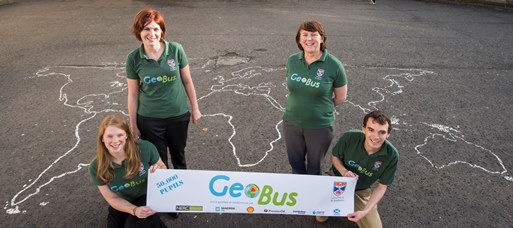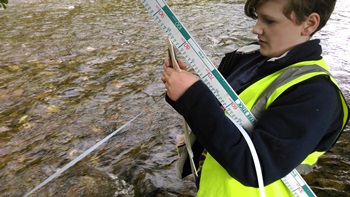Five years on, GeoBus is still going strong, making more stops than
ever across the country to deliver Earth Science educational resources in secondary
schools, writes Jennifer Brooke.
 In early 2017, GeoBus – an Earth Science education
project based at the University of St Andrews – celebrated five years since setting
off on its first journey around Scotland. Developed to support the teaching of Earth
Science in the Scottish curriculum through hands-on learning experiences, the
project now employs a team of three people and visits Scottish secondary schools
from Gretna to Shetland.
In early 2017, GeoBus – an Earth Science education
project based at the University of St Andrews – celebrated five years since setting
off on its first journey around Scotland. Developed to support the teaching of Earth
Science in the Scottish curriculum through hands-on learning experiences, the
project now employs a team of three people and visits Scottish secondary schools
from Gretna to Shetland.
With the removal of the Intermediate and Higher
Geology qualification from the Scottish curriculum in 2015, the inclusion of
Earth Science principles and skills across other subjects has become
increasingly important, as has providing support for teachers who may be less
confident delivering unfamiliar materials. The recent introduction of the new set
of Environmental Science qualifications (incorporating, for example, a module on
Earth’s Resource) has revived some of the fundamentals of Geology in schools
where it is offered, and GeoBus is
currently developing new workshops and resources to support this.
Picture: The GeoBus team (Jen, Kathyrn, Ruth, Sean) celebrating having taught over 50,000 pupils
Over the past five years, GeoBus has worked with over 54,000
school pupils and, in autumn 2016, the fleet was expanded with the launch of a
sister project at University College London. Part of the NERC ‘Deep Volatiles’
research programme, GeoBus UCL
is still in its early stages but has started visiting primary schools in London
to enthuse younger pupils about Earth Science.
“Every single workshop we have been involved with has been absolutely
excellent. Over the years, the GeoBus has become an integral part of our school
curriculum, and one which we plan to use for as long as it exists.” Ailith Stewart,
Teacher at Kingussie High School
North of the border, GeoBus remains in high demand and
teachers can choose from 25 different workshops covering topics from Scotland’s
Rock Story, to Plate Tectonics, to Renewable Energy. Schools often request
several workshops during each visit and a standard GeoBus day can involve anything from measuring and identifying dinosaur
tracks to modelling igneous intrusions using jelly and strawberry sauce. Several workshops are supported by additional
teaching resources that are available on the GeoBus website,
and the ‘What to do with CO2’ and ‘Exploring Beneath Our Feet’
Discovery Events (involving multiple linked workshops over the course of a full
school day) have been accredited such that participating pupils are eligible to
apply to the British Science Association (BSA) CREST Award scheme. In conjunction with
this, the project was awarded some
funding specifically to support p upils from disadvantaged backgrounds to
achieve their CREST Discovery/Bronze awards. With the rise of social media as a
tool for engagement, GeoBus is also
exploring new science communication approaches in order to reach a wider
interested audience. For example, the team has developed a series of ‘Geology
In A Minute’ videos (available on the GeoBus YouTube
channel) – many of which were designed by our creative undergraduate
interns – and interaction between schools, researchers and industry on is
promoted through Twitter (@GeoBus_StA).
upils from disadvantaged backgrounds to
achieve their CREST Discovery/Bronze awards. With the rise of social media as a
tool for engagement, GeoBus is also
exploring new science communication approaches in order to reach a wider
interested audience. For example, the team has developed a series of ‘Geology
In A Minute’ videos (available on the GeoBus YouTube
channel) – many of which were designed by our creative undergraduate
interns – and interaction between schools, researchers and industry on is
promoted through Twitter (@GeoBus_StA).
Picture: Jen investigating igneous intrusions using jelly & strawberry sauce
The delivery and development of teaching
packages for schools is a constant learning curve, but
one of the successful aspects of the project from the start has been the direct
involvement of University of St Andrews academics who study all branches of
Earth Science, including; planetary geology and exploration, astronomy, climate
change science, the evolution of oceans and atmospheres, mineral exploration,
glaciology, remote sensing technology, and understanding major events in
Earth’s history. This allows GeoBus
to deliver material directly related to current scientific research and to
serve as a bridge between academia, industry, and education. As a result,
teachers interacting with the project are constantly updated with the latest
research outcomes, and GeoBus is able
to help pupils discover the education and employment opportunities available to
them – both in Earth Science and in wider STEM subject areas.
In addition to classroom-based
workshops, GeoBus supports senior
pupils carrying out project fieldwork for Geography qualifications and
introduces key investigation skills with a particular focus on geological
aspects – such as rock type studies in river fieldwork and glaciation studies.
A residential Geology field camp
for pupils aged 16+ was successfully introduced in summer 2015 and will run
again in June 2017, allowing participants to gain experience of geology
fieldwork with excursions around the Fife and Lothian coast.
“Getting the opportunity to work with amazing people [on the GeoBus
field camp] was really helpful in influencing my decision about my future in
studying … I've also been able to transfer those skills into other subjects.” Eilidh Henderson, student
participant in GeoBus field-camp 2016
 Picture: Pebble analysis as part of a geological study during river fiedlwork with GeoBus
Picture: Pebble analysis as part of a geological study during river fiedlwork with GeoBus
Earth Science has an important
place in the education of the next generation, and by engaging pupils who would
not otherwise have been exposed to the subject, GeoBus is able to introduce its diversity and integration with
other subjects – lessons often end with comments along the lines of “who knew
Geology wasn’t just rocks”. The subject is truly interdisciplinary, and one of
the aims of GeoBus is to demonstrate
the wide range of options available to anyone entering an Earth Science related
career.
GeoBus has by no means reached its final destination and everyone
involved with the project is looking forward to the next five years, and more. In
the meantime, if you spot the van trundling around Scotland, be sure to give us
a wave!
Acknowledgements
GeoBus is grateful for past and present support from RCUK, industry
and professional societies. Our current Principle Sponsors are NERC, PremierOil and Shell, and we are also supported by the UK Space Agency.
For more information on the project and what we get up to, please see geobus.st-andrews.ac.uk or
find us on Twitter (@GeoBus_StA)
and Facebook (GeoBus St
Andrews).